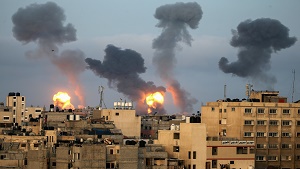Since 2021, the group has been engaged in ongoing battles with the Congolese Army and allied militias, leading to the control of large parts of the mineral-rich region.
The latest violence follows the collapse of Angola-mediated peace talks between DRC President Félix Tshisekedi and Rwanda’s Paul Kagame last month, resulting in a surge of renewed fighting and further civilian displacement.
Masisi, located in North Kivu province, is strategically important due to its proximity to the regional capital, Goma, and its role as a trading centre for the surrounding area. While Masisi has a relatively small population of around 40 000 people, its location makes it crucial for control of the broader region. The town has long been a battleground, with clashes between the M23 and other armed groups, including the Democratic Forces for the Liberation of Rwanda, which is thought to have connections with the Congolese government.
Professor Thomas Mandrup, an expert from Stellenbosch University and the Royal Danish Defence College, explained that the M23, which was originally disbanded in 2013, resurfaced in 2021. The group is largely Tutsi-dominated and has deep roots in the eastern DRC, particularly in North and South Kivu, where ethnic tensions and territorial disputes continue to fuel the conflict. Mandrup noted that the M23’s struggle is not only about military conquest but also about asserting the rights of Tutsi populations, who are often seen as outsiders in the region.
According to Mandrup, the situation in Masisi highlights the ongoing complexities of the conflict, which are driven by a mix of ethnic rivalries, political struggles, and the competition for control over valuable resources.
“The region is home to significant mineral deposits, adding another layer of interest for various armed groups, including the M23. The town's capture strengthens the M23's negotiating position in ongoing peace talks, especially as they push for greater recognition of their role in the region's future,” said Mandrup.
Despite efforts by the Congolese Army and international forces to quell the M23's resurgence, the group has proven difficult to contain. Mandrup pointed out that the M23 is now a far more organised and better-equipped force than it was in 2013, and its alliances, possibly with Rwanda, have added to its military strength. This evolution has made it harder for the Congolese Army, which remains poorly equipped and underprepared, to effectively respond to the rebel group's advances.
Diplomatic efforts have faltered, particularly after the failure of a ceasefire agreement in late 2023 and the breakdown of peace talks between Rwanda and the DRC in early January 2025. The DRC government has been reluctant to engage with the M23, viewing the group as a proxy force backed by Rwanda. However, experts suggest that without including the M23 in future negotiations, a long-term resolution to the conflict will remain elusive.
The situation is dire for the civilian population in the region, as ongoing violence and displacement continue to take a heavy toll. With no clear military solution in sight, many are calling for renewed diplomatic efforts and international intervention to address the root causes of the conflict and secure a sustainable peace for the people of eastern DRC.
--ChannelAfrica--













